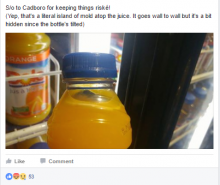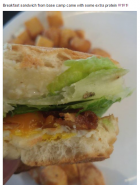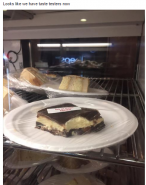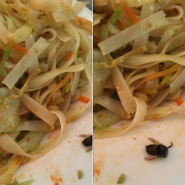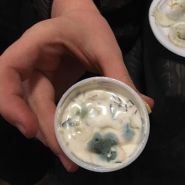Even before spotting the mangled fly peeking out from under the uncooked noodles of her green curry, Shae-Lynn Ouellette hadn’t been feeling well.
“I was like ‘What is this . . . it must just be a peanut,’” Ouellette described. “It turns out it was a fly. It was all chopped up . . . That kinda spoiled my appetite.”
Ouellette is one of many students this year who’s had an off-putting experience at one of UVic’s food venues. “UVic 2020,” a Facebook group for new first-year students, has been host to a plethora of allegations concerning health and safety violations witnessed at food service locations across campus.
Mouldy orange juice, bugs and feathers in fruit, mouldy tzatziki sauce, a fly in a breakfast sandwich, and even a metal screw in a falafel are just some of the horrors posted to the group over the last year. So far, all of them have involved venues under the UVic Food Services banner, and not outlets within the Student Union Building. Some photos are included below:
- Screenshot via Facebook
- Screenshot via Facebook
- Screenshot via Facebook
- Screenshot via Facebook
- Screenshot via Facebook
“I went to the juice racks at Cadboro [Commons] and saw something odd in one of the plastic bottles of orange juice,” said Jack Palmer, a first-year student on the front lines of the issue. “I picked it up to look closer and there was an iceberg of mould floating atop the juice.”
Palmer and Ouellette, both first-years, said they informed food service employees immediately, and Ouellette was refunded. Jim Forbes, director of Campus Services, could not confirm either of their allegations.
“I find it highly unlikely that most of these incidents occurred,” Forbes stated, though he did confirm metal was found in a falafel. But after an extensive investigation of the supplier and Village Greens prep areas, Forbes said it was inconclusive as to how it ended up there. Forbes’s comments also contradict photo evidence of the mouldy juice bottle posted on Facebook.
Kevin Tupper, UVSS director of finance and operations, was, along with Forbes, unaware of the allegations prior to being contacted for comment by the Martlet. “Frankly, the reports . . . are extremely disconcerting and extremely problematic for students’ health, their safety, and just feeling comfortable and welcomed on campus,” said Tupper.
When asked if he felt comfortable eating campus food, Palmer, who is on the full meal plan, responded, “Comfortable? No. Do I have other options? Also no.”
For 1 720 students currently on the full meal plan, this is a daily reality.
“I’m always looking in my food to see if there’s a fly in it now, which kind of sucks,” said Ouellette.
Emma Aisvan, who witnessed her friend purchase mouldy tzatziki sauce, said these incidents have impacted how she uses her meal plan. “I buy very few things at Cadboro, especially since I’ve seen the posts on the UVic 2020 page.”
Forbes said there is no need for paranoia. “We have a professionally managed staff who are all Food Safe-certified and we adhere to some very strict standards having to feed our resident population,” he stated.
Palmer, however, said the number of allegations is suspicious. “If they properly utilized Food Safe guidelines then incidents like flies being cooked into burgers, mould in the fruit salad bar and other horrors would be maybe twice a year at most — just freak accidents — not an acceptable weekly occurrence.”
Outside of students living on residence — the primary demographic for full meal plans — this issue is invisible. Although some students such as Palmer and Ouellette alerted Food Services employees, others simply didn’t see the point. “I feel pretty indifferent to it because I think the issue is out of students’ hands,” said Aisvan.
Kai Williams, a first-year Social Sciences student, agreed. “I find that there’s not much that we can do. We just need to eat.”
Tupper acknowledged the difficulty that individual students face when trying to solve this problem, and stressed the importance of them bringing issues to the attention of the UVSS, so the “collective weight of all students” could be used to enact positive change.
“Say it’s something small that one student thinks they can just ignore,” said Tupper, “it might be a very serious issue for someone else.”
Several students have suggested measures the university could take to ensure food quality. Williams, for example, recommended the implementation of expiration dates on condiments and refrigerated desserts.
Forbes expressed openness to this possibility, saying it’s “a level of transparency and professionalism that I think we’re more than happy to undertake, if it leads to a level of confidence.”
A Residential Dining Focus Group, made up of Community Leaders and students living on residence, met on March 7 to discuss, according to Forbes, “food quality, value, and environment.” Long term, Forbes plans to reconstitute the former Residential Dining Committee, which would represent student interests across campus, including graduate students, individuals in cluster housing, and those not registered for the full meal plan.
Additionally, Forbes is looking into the “baseline satisfaction” of campus food and plans to send out a survey to the resident community by the end of the semester.
“I think the reaching out to students should be happening regardless,” Tupper said. “I don’t think that a survey is necessarily going to give them a complete picture of what’s happening on campus.”
The UVSS is now working with the university to ensure these problems are addressed. “It’s important we don’t let this get swept under the rug, and if we hear further reports . . . we’re absolutely going to take it extremely seriously,” Tupper said. “Somewhere along the line in food services, serious mistakes were made. UVic is committed to avoiding these future mistakes.”
Tupper encourages any student with something wrong with their food to reach out by email to him at finance@uvss.ca, or any board member, or the university ombudsperson. Forbes also implores students to email any comments regarding food services to eat@uvic.ca.
“It’s not something where we can be good 80 per cent of the time, it’s not something where UVic can be good 90 per cent of the time,” Tupper stated. “Students health and safety needs to be 100 per cent, or incredibly close to that.”
Correction: We previously reported the email that students could contact with concerns was “eats@uvic.ca,” when it’s actually just “eat@uvic.ca.” We regret the error.
Editor’s note: Since the publication of this article, Jim Forbes has contacted The Martlet to say that a tour of the commercial kitchens was offered to the author, but was declined. The Martlet regrets the omission of this fact, and will ensure proper standards of disclosure are met in the future.



